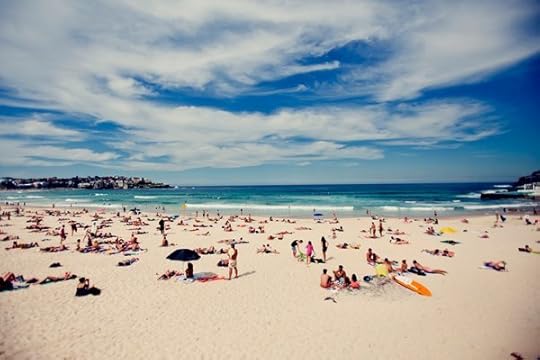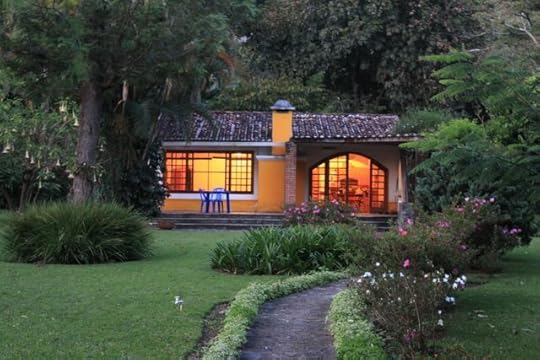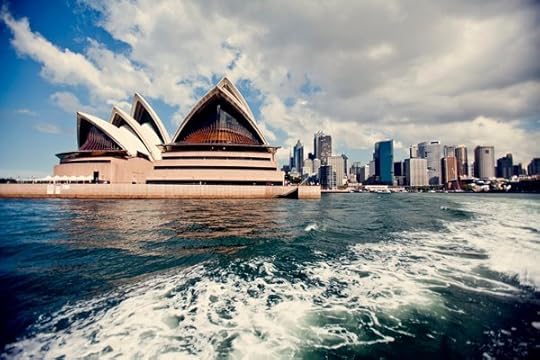Rolf Potts's Blog, page 48
February 6, 2014
Giving free travel talks—A great way to share knowledge and ignite travel dreams
Vagablogging :: Rolf Potts Vagabonding Blog
Last weekend, on a sunny Saturday morning at a local Seattle-area library, I kicked off the first of several ninety-minute “Travel talks” I plan to give this year. The seminar-style presentations, which I call “Traveling The Best of Europe Independently & On A Budget” will be free, presented at assorted libraries in the Seattle metro area.
I began doing these talks several years ago after answering the umpteenth question about how to travel independently in Europe (since that’s my specialty), how to plan it, and where to go. I realized there was a hunger for this type of straight-up advice from a trusted source. Since then I’ve done several, and I’m always stuck by audiences’ desire for useful tips and, more importantly, a much-needed infusion of “Hey, I can do this!” confidence.
Some have asked why I bother doing these talks when it’s basically free work and free advice. My answer: Sharing my hard-won tips on budgeting, itinerary-crafting, and other how-to essentials is a joy. Moreover, it’s a public service. More than just the mere nuts-and-bolts information, I’ve found that it’s the message of “you can do it too!” that is truly valuable, no matter what destination you’re discussing. Any guidebook will have a chapter on the basics needed to plan a trip and where to go, but it’s a presenter’s confidence and palpable love for the subject that can inspire someone to finally book that plane ticket.

Tiber River in Rome
So, if you’re inclined to spread your knowledge and love of whatever destination you choose, please consider offering a ninety-minute “how to travel independently & on a budget to…” presentation at a local library. Impart your wisdom and fill the room with your enthusiasm for the places you’re talking about. You might just motivate a reluctant adventurer to take the trip of a lifetime, and that is time well spent indeed.
Original article can be found here: Giving free travel talks—A great way to share knowledge and ignite travel dreams
February 4, 2014
We’re traveling in someone’s backyard
Vagablogging :: Rolf Potts Vagabonding Blog
Whenever you go on a trip to visit foreign lands or distant places, remember that they are all someone’s home and backyard.
— Vera Nazarian
Our first year traveling full time we spent on bicycles. It was a beautiful way to see the world. The drumbeat of pedal strokes become meditation, if you do it long enough. The predictable pattern to days is comforting in its simplicity: Pack the tent, ride 25 miles, picnic in the sun, ride 25 miles, set up the tent. Wash, rinse, repeat. Cycling forces an interaction with the landscape and the people who inhabit it that travel inside a vehicle does not. I love that.
But then, we turned a corner, our gap year became our life and we realized that we were going to keep going, keep traveling and our approach changed. We slowed down. We took to renting places for a few months at time instead of packing the tents every day. In sitting still we see a place differently than we do if we’re moving through, even if we’re moving in the slowest, most interactive way possible.
What is new and exotic to me is mundane to someone else. My favourite beach and dive vacation spot is on a stretch of ocean that is life and economic stability to someone else. The secret place I love to spend the winter might be heaven to me, but it’s a status quo prison to my friend who cannot escape it.
I don’t think about this enough. Most people don’t, I’d wager. If we did, we would travel differently, perhaps. Can we talk about that? How does the knowledge, and a growing understanding, of the fact that everywhere we go is someone else’s home and backyard change how we walk through this world? How should it?
Original article can be found here: We’re traveling in someone’s backyard
February 2, 2014
Lionel Cassel on how guidebooks differ from travelogues
Vagablogging :: Rolf Potts Vagabonding Blog
“Wit, style, a keen and original mind, an eye for the unusual — these are what delight us in the travelogue writer. The compiler of a guidebook, on the other hand, must be a totally different kind of person. His job is to report the location, dimensions, age, and life-history of the monuments, and only incidentally, if at all the emotions or associations they arouse in his breast. Wit and originality have no place in such an assignment; in fact, they might very well get in the way. What he requires above all are the matter-of-fact virtues of thoroughness, diligence, and accuracy.”
–Lionel Casson, Travel in the Ancient World (1974)
(1974)
Original article can be found here: Lionel Cassel on how guidebooks differ from travelogues
January 28, 2014
Why do you go away?
Vagablogging :: Rolf Potts Vagabonding Blog
Why do you go away? So that you can come back. So that you can see the place you came from with new eyes and extra colors. And the people there see you differently, too. Coming back to where you started is not the same as never leaving.
— Terry Pratchett, A Hat Full of Sky
Why do we go away? An interesting question to ponder.
To explore
To escape
To learn
To clear our heads
To fill our heads
To experience
To think
To heal
To search for something
To find ourselves
To rest
To serve
To create something
…
And what Terry says is very true as well: we travel so that we can come back.
Homecoming is an integral part of journeying. Almost everyone does it at some point. It’s a surprise when we first discover that home did not wait quietly for us, preserved like an exhibit in the museum of our minds. It is sometimes a shock to find that, although we have returned, we are not, in fact, home in the same sense as when we left it. When we take off to travel, we are, in many senses, the place we leave. Indiana is taken to Borneo, Borneo is seen through Indiana’s eyes. When we return, we bring Borneo with us, and he points out things in Indiana we never noticed before he shared his lenses with us. To me, that is the single most important function of travel: the ability to see home through new eyes, to evaluate the common from an angle we’d never considered. Instead of looking at the world through our cultural telescope, we begin to see the world like a marble at the end of a kaleidoscope. Same place. Entirely different view.
What about you? Why do you travel? What have you noticed upon coming home?
Original article can be found here: Why do you go away?
January 26, 2014
Peter Hessler on the ironic merits of the Peace Corps
Vagablogging :: Rolf Potts Vagabonding Blog
“Sometimes I thought of the Peace Corps as a reverse refugee organization, displacing all of us lost Midwesterners, and it was probably the only government entity that taught Americans to abandon key national characteristics. Pride, ambition, impatience, the instinct to control, the desire to accumulate, the missionary impulse — all of it slipped away.”
–Peter Hessler, Strange Stones: Dispatches from East and West (2013)
(2013)
Original article can be found here: Peter Hessler on the ironic merits of the Peace Corps
January 21, 2014
Traveling Wisdom: NTAF
Vagablogging :: Rolf Potts Vagabonding Blog
You can trust me when I say that any morning beginning with vomit and a side order of anti-diarrheals with breakfast for two thirds of the family is a harbinger of things to come. Add the words “chicken bus” to the breakfast conversation and it’s the perfect storm of endlessly horrific possibilities.
Every single chicken bus ride is worthy of it’s own blog post somewhere. I’ve yet to ride one in which I did not have a near death experience, sit within a whirlpool of humanity that just begged for comment, or just suffered enough to feel justified in a good rant; and that’s without giving time to the animal passengers that enliven the experience from time to time.
There really are no words adequate to the experience of being whisked aboard an old Bluebird bus, painted like a time machine, pimped out like a seventies low-rider and covered inside with enormous neon coloured stickers of the Virgin Mary and others reading things like, “God bless your entrance and exit of this bus,” “Please don’t mistreat the signs,” “Your children’s safety is our priority” (a Bluebird original) “Jesus is my co-pilot” or “Driving slowly saves lives.”
Taking a page out of the Mayan mujeres book it seems entirely reasonable to genuflect slightly to the Mother Mary sticker, cross one’s self and say a quick prayer to the patron saint of the slightly insane for deliverance from this necessary evil.
The bus up from Antigua to Chimaltenango gets a gold star for being the most harrowing thus far. I really did see my life flash before my eyes, and I was reminded of the tornado scene in The Wizard of Oz as I, like Dorothy, watched the swirl of cows, bicicleros, old men with goats and numerous small cars whirl just out of the way of the flying bus. More than one expletive was uttered, in more than one language by the passengers and there was a muttered undertone, that didn’t need translation, as to the appropriate description for our confident driver.
Getting seven people ON to one chicken bus is one adventure. Making sure you get the same seven OFF at the same stop, is quite another. I confess, on our previous exchange in Chimaltenango, to actually chasing the departing bus down the main street shouting, “HEY!! I’ve got one more kid on there!! Dang it!!” in Spanish before realizing that there were actually two kids, and Daddy too, being whisked away at lightning speed.
Tony was off circulating between the tiendas up and down the block looking for ginger ale with real ginger for Ruth and Ez, who were both feeling green, while the rest of us held down our piece of sidewalk with the crowd of hopeful passengers waiting for their next bus on the corner of Washington and Jefferson on the main drag when it happened:
Ezra groaned, threw back his head in his signature “Oh man!” look and announced, “I have a personal problem!” Which is quite an improvement from where he started at three, in Mexico when he had “a personal problem” and threw himself down in the Cancun airport shouting, “I’m POOPING TO DEATH!”
I rolled my eyes on the inside and asked, as cheerfully as I could, “I’m sorry, what it it?”
“Remember what Dad said about never trusting a fart… well…”
I rolled my eyes on the outside as the news passed between the children met with varying degrees of guffaw and disgust while Ruth just laughed. Tony wandered by, without ginger ale in hand, and muttered under his breath, “It’s a party now!”
After several moments of drama and debate that I’ll leave to your imagination I found myself standing shoulder to shoulder with my red haired cousin, our backs to a niche in the concrete wall, giggling, uncontrollably.
“You know all those people that send us gushy e-mail, wishing they could travel and have our life? THIS is totally what they’re missing. EVERYONE wants THIS life!”
Ruth, also giggling uncontrollably nodded beneath her straw hat and we peered over our shoulders just in time to see Ez finishing his clean up with what was left of his underwear and getting back into his drawers, commando.
Emerging looking only slightly scathed he settled under his Dad’s big eyeball trained directly on his two little beady ones and they made the agreement, one more time: Never, NEVER trust a fart.
Original article can be found here: Traveling Wisdom: NTAF
January 19, 2014
Writing about home is harder than writing about exotic places
Vagablogging :: Rolf Potts Vagabonding Blog
“China is easier to write about than Cheyenne, Leningrad easier than Louisville. But to see Cheyenne and Louisville written about well, to see the dailiness of America brought to life with freshness and humor, is to watch one of the hardest high-wire acts in travel writing.”
–William Zinsser, They Went: The Art and Craft of Travel Writing (1991)
(1991)
Original article can be found here: Writing about home is harder than writing about exotic places
January 15, 2014
Vagabonding Field Report: Sydney to Cairns, Australia
Vagablogging :: Rolf Potts Vagabonding Blog
Cost/day: $50
What’s the strangest thing you’ve seen lately?
A duck-billed platypus. Though sadly, it was only in the zoo. My friend and I were constantly on the lookout for one in the wild and we were let down big time to never come across one.
 Describe a typical day:
Describe a typical day:
Every day that we were in southern Australia was beautiful and sunny and warm. We went to the zoo and beaches, walked around Sydney taking photos, got lost on trains, hitchhiked, cooked pasta in our hostel every night, visited our friends that we met in the Asian district and helped them at their shop, and tried to avoid the terrifying animals/insects you hear so much about. When we made it up to Cairns, we had the bad luck of hitting some bad weather. It rained pretty much every day for a week, but we spent the time with people at our hostel from all over the world, cooking and talking and going out at night. We had a really lovely time.
Describe an interesting conversation you had with a local:
We did a bit of hitchhiking in Australia, which for some reason we had assumed was pretty safe. In our experience, it was– in fact, we were picked up by some really amazing, fun, generous people. One group even took us to a bar-b-q and put us up for the night. But, everyone that stopped for us said they did so out of concern for our safety…apparently there was a notorious killer who had just been jailed for murdering people he had picked up hitchhiking. This was interesting to find out.
What do you like about where you are? Dislike?
I really liked the people in Australia. Everyone seemed to come with a generous, boisterous, adventurous spirit and was instantly likeable. The spaciousness was really nice too, it made everything feel exciting and infinite. Sydney was one of the most beautiful cities I’ve been to, and once we were out of the cities we loved it even more. Nature was overwhelming, exotic, and perfectly photogenic there.
Describe a challenge you faced:
Sometimes it was difficult figuring out how to get around since Australia is so huge and sometimes a little expensive.
What new lesson did you learn?
Australia was the near the beginning of our round-the-world trip, so I really learned how capable I was when it comes to traveling and problem solving. Getting around with no idea where you are or exactly where you’re going was a very new experience, and fortunately it was fun and life-changing. It made me realize that travel is one of the best things I could ever do with my time, money, and resources. Also, Vegemite is disgusting.
Where next?
Next is on to Peru and Hawaii!
Original article can be found here: Vagabonding Field Report: Sydney to Cairns, Australia
January 14, 2014
Preparing kids to travel? Play games.
Vagablogging :: Rolf Potts Vagabonding Blog
We’ve always been big on making a game out of learning new skills, and turning even the ho-hum into an adventure for our kids. When they were tiny and we were preparing to take them to exotic places for the first time, we came up with a series of games we played at home to get them ready. Even big kids have fun with these:
Tooth Brush Drills
Perhaps the number one way people become ill when traveling is from ingesting local water that contains contaminants, or parasites, or some other ugly, microscopic critter. Remembering not to drink the water is easy.
Remembering not to rinse your toothbrush, is not. Tooth brushing is one of those things we do on autopilot, and we have to retrain ourselves NOT to use sink water when we do it.
Randomly announce that the bathroom has been transported to Mexico, or North Africa, or Myanmar, and as such, the water is not to be trusted.
Place a water bottle by the sink and teach your children how to rinse their tooth brushes, swish and spit using only the water in that bottle.
Make it fun by making a loud buzzer noise if a child touches the faucet, or by announcing that the child has contracted some horrible plague and must now take his medicine (make it fun medicine, this is a game!)
Our youngest child, at three, was the toothbrush police when we traveled. He’d be the one yelling loudly from the bathroom, “DON’T DRINK THE WATER!! DON’T RINSE YOUR TOOTHBRUSH!! YOU’LL BE SORRY!!!!”
International Dinners
Many parents worry about their children’s eating habits as they travel. Some children are very difficult when it comes to meal times and encouraging flexibility and dietary branching out can be a real challenge. One of the ways that we encouraged a broad palate in our children, from the time they were babies, was to have an international dinner at least once a week.
Choose a country, head to the library (or search on line) for recipes native to that place.
Shop for the foods and do the cooking together with your kids.
Decorate the table with a map of that country, or a drawing of the flag your child makes.
Find some music from that country to play, and maybe a story book about life there, or the mythology of the culture.
Don’t just introduce a new food, introduce a new people, place, and type of life experience.
These are the tiny steps that are easy to take in world schooling our children without ever leaving home.
We often tried to schedule the international dinners to coincide with evenings when we were having guests for dinner. Other families are often eager to join the party and bring something they’ve learned about that country to share. If you can find an actual PERSON to invite to dinner (or perhaps even cook with your family) so much the better!
The goal of this game is to make foreign people, places and their foods less scary to skeptical little people.
It is certainly fine for kids, and adults, to prefer some foods over others, and no child need eat a whole plate of lima beans if they truly dislike them. However, taking one bite of something before passing judgement on it is a requirement at our house.
There are cultures in which refusing food is the height of rudeness and our children need to be prepared to honor their hosts, be grateful for what is set before them, and try anything. Besides, sometimes they find that the slimy looking green stuff on top of their tacos (nopales-cactus paddle) is actually their new favorite thing!
Power Free Evenings
We’re a pretty plugged in society, in general. Rare is the household that doesn’t have a TV, game console, ipods, computers, DVD players or some configuration thereof. Some families have one of each in every child’s room. Kids who are used to so much electronic entertainment may have difficulty unplugging while on the road and declare themselves “bored” fairly quickly.
I am in NO WAY anti-media. But I am definitely in favor of the judicious use of it.
Our kids enjoy a movie night as much as anyone. They each have their own ipod. We have six computers in a family of six people. But we’re not emotionally dependent on these things for our happiness, or for contentment in the car, or at home, or anywhere else.
Unplugging once in a while has its merits, especially for children who need to develop a whole range of coping mechanisms for the rest of their lives. Self entertainment and the ability to be content with very little is not a small thing, and is relatively easily accomplished, simply by adhering to the “less is more” philosophy of stuff and tech time for kids.
Good friends of ours practice this with “power free evenings” once a week.
Every Friday afternoon at around 4 p.m. they unplug everything in the house but the fridge.
They light candles for dinner, play board games after dinner, read aloud from a good book, color, paint, play dominoes, put on plays for one another… anything and everything that does not require an electrical outlet to enjoy it.
This is a GREAT strategy for preparing children to travel to places where there may or may not be reliable electricity–or any electricity at all.
When our power was cut for three days in Africa, the children just assumed we were playing an extended game of “Power Free Evenings” and we had a lot of fun.
No Toys Allowed
Whether you are hiking to your favorite picnic spot in the woods, spending the day on the shores of a lake, or sunning yourself on the beach, try leaving all toys at home. This encourages kids to use their imaginations and make do with what is around them.
One of our kids created a game called “Kingdom Building” and is always on the lookout for a good pile of rocks to build his castles. With sticks for people and rocks for building material, what more could a kid want?
Bathroom Fun
Children are notoriously amused by bathrooms, at home and abroad. I’ll never forget my oldest son’s first encounter with a bidet in Mexico City or the slightly disturbed and violated look on his face after attempting to use it for the first time! We never quite got over the jokes about squatties in southern Italy and Africa… but then, we have three boys.
In our usual vein of “let’s prepare them at home before being embarrassed abroad,” we practiced for “different” bathrooms at home. How? By posting a sign that informed users the bathroom was now in Germany and no one could use it without paying fifty cents, or Mexico and in order to get a few sheets of toilet paper one would need to pay a quarter to whichever family member had been designated the keeper of the toilet paper.
If you want to get really “authentic,” take the toilet paper out altogether and put a plastic coke bottle with a hole drilled in the cap by the toilet filled with water… portable bidet like we saw over and over in Tunisia.
This game is the MOST fun if you wait to play it until you have friends over for the day!
Original article can be found here: Preparing kids to travel? Play games.
January 12, 2014
There is more reason to travel than ever
Vagablogging :: Rolf Potts Vagabonding Blog
“Reading and restlessness — dissatisfaction at home, a sourness at being indoors, and a notion that the real world was elsewhere — made me a traveler. If the Internet was everything it was cracked up to be, we would all stay home and be brilliantly witty and insightful. Yet with so much contradictory information available, there is more reason to travel than ever before: to look closer, to dig deeper, to sort the authentic from the fake, to verify, to smell, to touch, to hear and sometimes – importantly – to suffer the effects of this curiosity.”
–Paul Theroux, The Last Train to Zona Verde (2013)
(2013)
Original article can be found here: There is more reason to travel than ever
Rolf Potts's Blog
- Rolf Potts's profile
- 323 followers




















